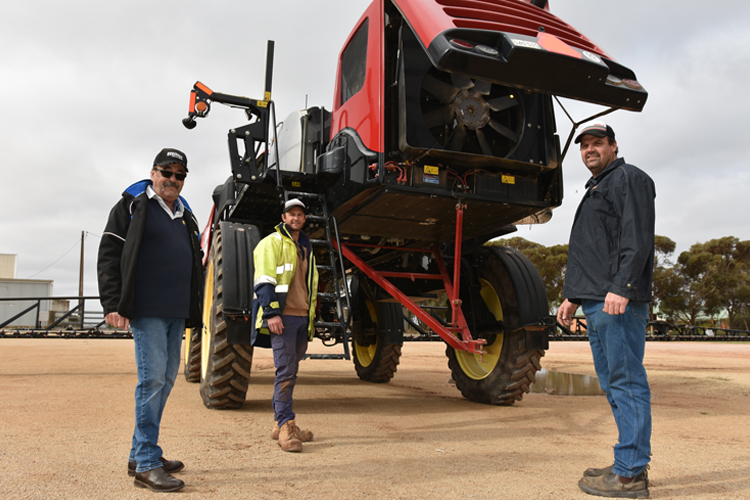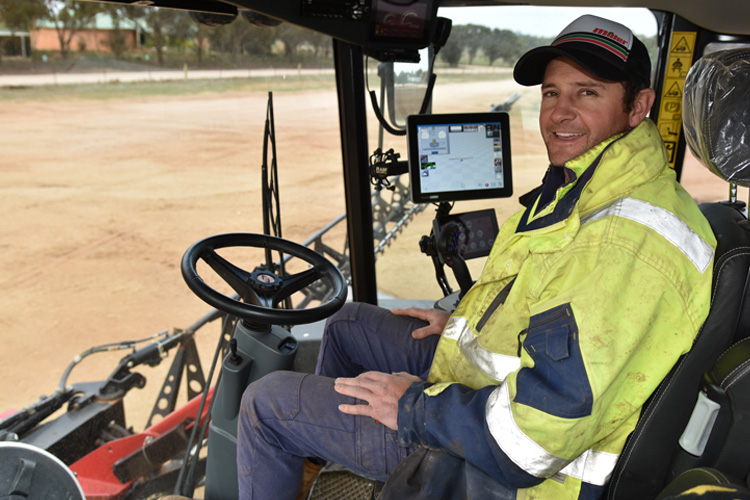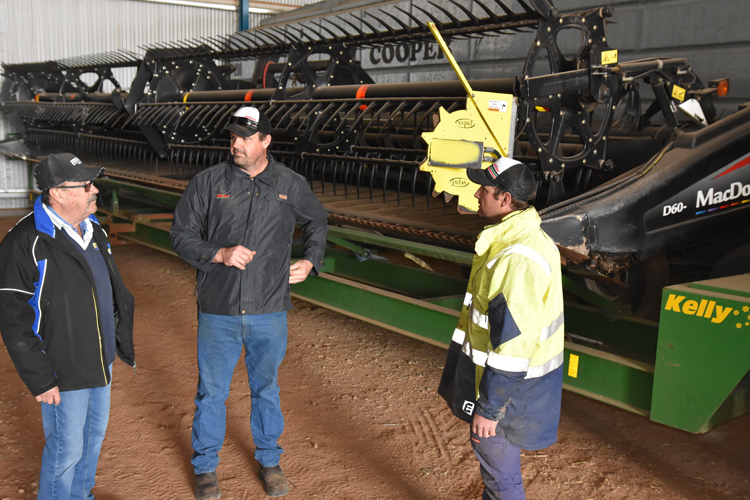Miller gets nod for most used farm machine

Steve Williams, Flinders Machinery, Leigh Fuller and Nigel Hodge, McIntosh Distribution, look over some of the latest advancements with the Fuller’s Miller Nitro 7380 sprayer, including the upgrade from a Cummins to an IVECO engine. Leigh says the increased power and torque, as well as fuel efficiency, from the new motor, together with the planetary drive system first introduced with the Miller Nitro 6000 Series sprayers, is very noticeable.
THE most used machine on a farm is always going to involve a careful decision and for the Fuller family at Koolunga in the State’s Mid North, it’s the reason behind a long journey with Miller sprayers.
Leigh and Cassie Fuller, together with Leigh’s parents, Gary and Anne, and uncle and aunty, Craig and Wendy, crop 3400 hectares of their ‘Viewbank’ property to wheat, barley, canola, faba beans, lentils and vetch pasture. They also turnover 10,000-15,000 trade sheep annually, including through a feedlot on the property, which is located in a 400-millimetre rainfall belt and comprises mostly clay loam soils.
Like for many growers, weed pressures drive a lot of farm management decisions – and time spent in the cab of the Miller sprayers.
Ryegrass remains the number one target, particularly herbicide-resistant populations on some continuously cropped country.
Leigh said barley grass also was “rearing its head’’, as was brome grass and bifora to a lesser extent, although the latter was effectively controlled with Intervix herbicide as part of Clearfield crop production systems.

Leigh Fuller, Koolunga, SA, says the family’s Miller sprayer is put to work “pretty much every month’’ on their ‘Viewbank’ property.
Other strategies to help limit weed numbers have included burning canola windrows, chaff lining and a planned move to harvester-integrated weed seed control technology this season, as well as croptopping and swath spraying canola and some barley – more jobs completed with their Miller sprayer.
“We average probably four spray passes per crop, including summer and knockdown sprays, post-emergent herbicide applications and then fungicide sprays over a good portion of the property. We are getting a bit more septoria (disease) in the wheat-on-wheat. And then we spraytop all legumes and do the windrowing (with the Miller),’’ Leigh said.
“It would do the most hours of all machines. It does something pretty much every month.’’
The family started with a Miller Nitro 4275 sprayer before updating to a 5333 model and then to their latest 36-metre Miller Nitro 7380 rig last spring, via Flinders Machinery at Booleroo Centre.
The new sprayer has allowed a number of upgrades for the Fullers, including higher horsepower from an IVECO motor compared with a Cummins engine; new guidance, assisted steering and product control from Raven; 10 spray sections across a truss boom instead of five sections across a mono boom; and higher clearance from 50-inch tyres, as well as improvements with air shut-off, boom recirculation and hydraulics.
A single spray line is used across the boom, with AIXR TeeJet 015 and 02 nozzles spaced at 25-centimetre intervals. Spraying speeds average 21-22 kilometres per hour at 1800 RPM, dipping to 18km/hr at 1600 RPM in hilly country, where Leigh said the near 50:50 weight balance of the Miller Nitro 7380 also was excellent for stability.
Most sprays are applied with water rates up to 100 litres per hectare, coming down to 70-80L/ha for broadleaf herbicides.
Leigh said the increased power and torque, as well as fuel efficiency, from the new IVECO motor and planetary drive system first introduced with the Miller Nitro 6000 Series sprayers was very noticeable.
The IVECO Tier 2 turbo diesel engine delivers 383 peak horsepower with 1459NM of torque for the Nitro 7380 sprayer. It steps up to 434 peak horsepower with 1629NM of torque for the 7420 model in the range.
A hydrostatic Danfoss pump system featuring electronically-controlled variable displacement piston drive motors and integrated Fairfield Torque-Hub planetary final drives are responsible for the improved drive performance.
“When we started spraying with it, we thought: ‘This is good going’,’’ Gary said.
“With the old sprayer we would get about 600ha to a tank of fuel, whereas we are over 1000ha with this one, so it’s a 30-40 per cent fuel saving.
“The only time it really uses fuel is when we are going down the road.
“We can now spray about 300ha in a day. And it’s a lot quieter. The Cummins engine used to bark a bit.’’
The complete chassis and suspension system on the latest Miller sprayers has been purposely designed with added strength for the Australian market.
Leigh said the truss boom also provided a better ride and their MacDon windrower worked well with the front-mounted sprayer.
“The front mount for good spraying visibility and the ability to windrow canola was why we originally got into the Miller sprayers.’’
“We also swath at 1800 RPM and it is a good swathing machine with its height and clearance, as well as better hydraulics.’’

Pictured right discussing the use of the MacDon windrower on the Miller Nitro 7380 with Steve and Nigel, Leigh says the ability to windrow canola was the reason they originally selected the front-mounted Miller sprayers, as well as their height, clearance and better hydraulics.
In the cab of their latest Miller Nitro 7380, he said the display screens were a lot more intuitive and user-friendly, and the passenger seat fridge was handy.
Meanwhile, the Raven XRT high resolution height control system, ensuring booms remain at optimum spraying height for longer, and one-touch auto-folding also are available with the latest Miller 7000 Series sprayers.
The Fullers have already clocked about 460 hours with their Nitro 7380 sprayer and said they were most pleased with the service and support for the new rig from Flinders Machinery and national Miller sprayers distributor, McIntosh Distribution.
“We have been very happy with the backup and support,’’ Leigh said.
“If you can pick up the phone, get answered and get support straight away, it’s a good fit. And their knowledge on the machine is also very good.’’












